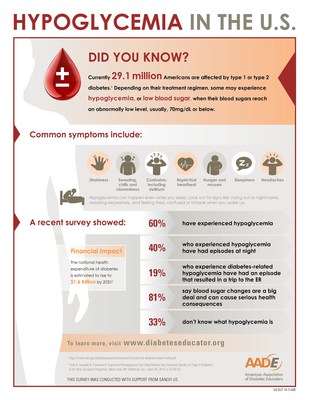American Association of Diabetes Educators Release: Survey Shows Many People Living With Diabetes Are Uncertain About How To Properly Manage Hypoglycemia
CHICAGO, Jan. 20, 2015 /PRNewswire-USNewswire/ -- Today, the American Association of Diabetes Educators (AADE) announced findings from an online survey of 1,000 U.S. adults living with type 1 or type 2 diabetes on hypoglycemia, also known as low blood sugar (glucose), showing that a majority of respondents (62 percent) are concerned about experiencing the condition, with 81 percent viewing it as a significant health concern. In addition, the survey indicated that respondents were uncertain of how to help prevent and manage the condition, indicating a need for further education about hypoglycemia. The survey was supported by Sanofi US.

Sixty percent of those surveyed have experienced hypoglycemia and 19 percent of those who experienced hypoglycemia visited the emergency room for treatment. Respondents expressed concern about the potential severity of the condition, with 98 percent recognizing the importance of controlling hypoglycemia and 81 percent acknowledging the serious health consequences if not properly addressed.
Significant drops in blood sugar during the night, or nighttime hypoglycemia, can be common in people living with type 1 or type 2 diabetes on insulin and is a cause of anxiety and concern for many. Of those who experienced hypoglycemia, forty percent experienced it during the night and the majority reported feeling anxiety (84 percent), frustration (68 percent) and fear (60 percent) about nighttime hypoglycemia.
The findings showcase a need for further education about hypoglycemia. People living with diabetes may be unaware of the causes, symptoms as well as the methods of preventing and managing hypoglycemia as evidenced by the following survey findings:
- Of respondents who had not experienced hypoglycemia, approximately 42 percent were unable to define it correctly
- Less than one third (30 percent) of respondents cited avoiding alcohol as a way to prevent hypoglycemia
- Nearly half (49 percent) were not aware that taking glucose tablets could help treat an episode
"Hypoglycemia can be a potentially debilitatingbut often underrecognizedcomplication for people living with diabetes. In addition to knowing the warning signs and symptoms of hypoglycemia, people living with diabetes should be informed about how to effectively manage and prevent its onset," said Evan Sisson, PharmD, MHA, CDE, an Associate Professor at Virginia Commonwealth University School of Pharmacy and former member of the Board of Directors for the American Association of Diabetes Educators. "By consistently monitoring one's blood sugar and working with a diabetes educator, individuals can effectively manage their diabetes and hope to reduce their risk of hypoglycemia."
Hypoglycemia occurs when blood sugars reach a low level, usually 70mg/dL or below, and can affect people living with type 1 or type 2 diabetes, who are on insulin or multiple therapies for diabetes. Symptoms of hypoglycemia include shakiness, dizziness, fatigue, confusion and lack of coordination. In severe cases, hypoglycemia can lead to unconciousness, seizures or death.
To treat hypoglycemia, those living with diabetes should regularly check their blood sugar levels. If levels are 70mg/dL or lower, it is recommended to consume 15-20 grams of carbohydrates and check levels again 15 minutes following consumption. If low blood sugar levels continue, repeat. Once blood sugar returns to normal, the individual should consume a small snack if the next planned meal or snack is more than an hour or two away to prevent recurrence of hypoglycemia.
"These survey findings illustrate the importance of educating about hypoglycemia," said Andrew Purcell, Vice President and Head of U.S. Diabetes, Sanofi US. "Working with the AADE, we are committed to raising awareness about the impact and management of hypoglycemia and how those living with diabetes can help to reduce their risk of having a low blood sugar event."
The survey polled 1,000 U.S. adults aged 18 or older who have been diagnosed with type 1 or type 2 diabetes. Participants completed an online survey between September 23, 2014, and October 1, 2014.
For more information about the survey results and hypoglycemia, visit www.diabeteseducator.org.
About AADE:
Founded in 1973, AADE is a multi-disciplinary professional membership organization dedicated to improving diabetes care through education. With more than 14,000 professional members including nurses, dietitians, pharmacists, and others, AADE has a vast network of practitioners involved in the daily treatment of diabetes patients.
More than 3,000 healthcare professionals are expected to gather at the AADE15 Annual Meeting and Exhibition in New Orleans, LA, August 5-8, 2015. Learn more at www.diabeteseducator.org.
Photo - http://photos.prnewswire.com/prnh/20150116/169719-INFO
To view the original version on PR Newswire, visit:http://www.prnewswire.com/news-releases/survey-shows-many-people-living-with-diabetes-are-uncertain-about-how-to-properly-manage-hypoglycemia-300022688.html
SOURCE American Association of Diabetes Educators
 Help employers find you! Check out all the jobs and post your resume.
Help employers find you! Check out all the jobs and post your resume.
